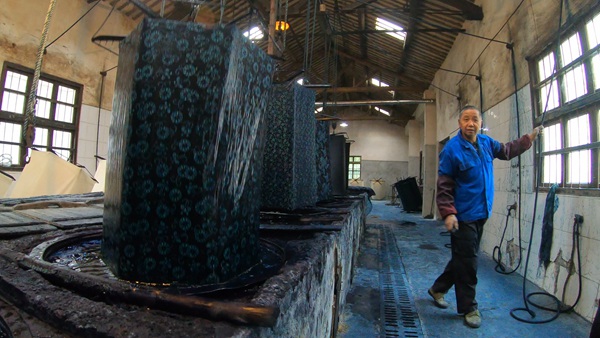The dying craft of dyeing cloth
Traditional indigo textiles are making a comeback after falling out of public favor in the 1980s
 |
|
Zhou Jiming's Tongxiang Indigo Print Making is one of the oldest workshops for blue floral print cloth in Tongxiang, Zhejiang province. Photos by Gao Erqiang / China Daily |
One of the first things that catches the eye upon entering Wuzhen from its Xiazha entrance are the long pieces of indigo textiles with white patterns that gently sway from tall poles.
Called lan yin hua bu, or "blue floral print cloth", these creations are the product of a traditional craft that has been around for thousands of years.
According to Xun Zi, a book on Confucianism, Chinese had as early as the 3rd century BC been extracting indigo dye from plants, but it was only around the Song Dynasty (960-1279) when this dye was widely used for textiles.
Such textiles were widely used in society up until the late 1980s when its popularity started to decline because machines could quickly manufacture synthetic dyes that came in different colors. Consumers were now spoilt for choice. Indigo just didn't seem very exciting anymore.
"During my childhood in the 1960s, clothes, tablecloth and curtains were all made by this textile," recalled Zhou Jiming, who runs Tongxiang Indigo Print Making, one of the oldest workshops for such cloth in the city.
"During the peak of this craft in the mid-1980s, our company had about 130 workers and our products were exported to places like Japan. Today, we only have around 20 workers."
Zhou was 28 when he first learned how to do indigo dyeing at a workshop that was located along the route to his school. He later joined Tongxiang Indigo Print Making and has since been working there for the past 32 years.



























